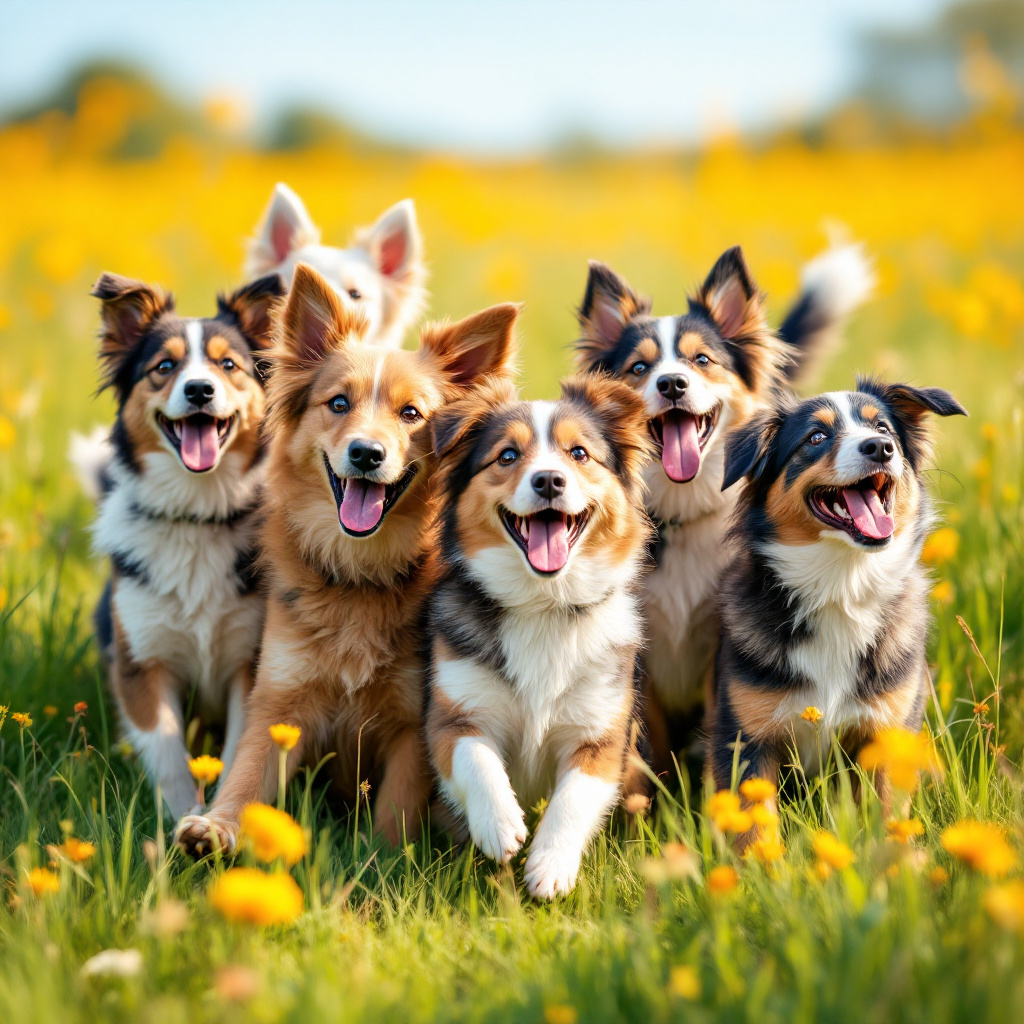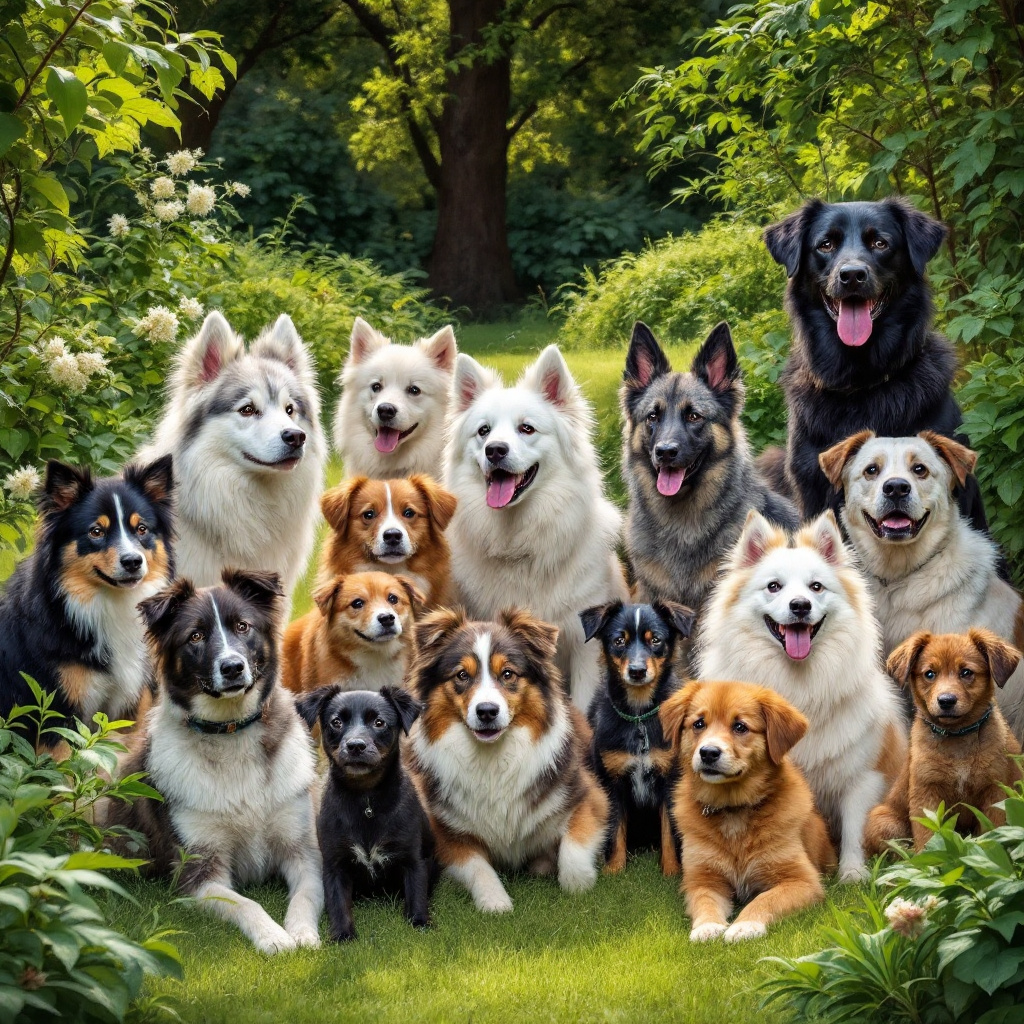The fascinating world of mixed-breed dogs: Diversity and vitality
Mixed breeds, or simply called mongrels, are the result of crossing two different dog breeds. These charming four-legged friends often combine the best of both worlds and offer a genetic diversity that purebred dogs sometimes lack. Now, grab your reading glasses and let's delve into the fascinating world of these dogs together!
The origin: What are mixed-breed dogs?
Originally, mixed-breed dogs were often created by chance rather than intentionally. Nowadays, however, there is a growing movement towards deliberate crossbreeding, giving rise to so-called designer dogs. Imagine the following: The ideal characteristics of different breeds combined in one dog - doesn't that sound exciting?
Some of these crosses have become prominent names, including:
- Labradoodle: A combination of Labrador Retriever and Poodle.
- Cockapoo: The result of the union of Cocker Spaniel and Poodle.
- Puggle: A charming alliance of pug and beagle.
Genetic diversity: the strength of mixed-breed dogs
Mixed-breed dogs often benefit from a phenomenon known as hybrid vigour or heterosis. And no, this is not a new dance style! It describes the observation that mixed and genetically diverse populations are often more robust and resistant to disease. This often results in healthier and longer-lived dogs.
Health benefits and robustness
Who would have thought that mixed-breed dogs could score points here? Due to their genetic diversity, they are less susceptible to certain hereditary diseases that are more common in purebred dogs. So having a mixed breed dog can not only save your heart, but also your wallet - fewer vet visits, yay!
Character and temperament: what can you expect?
If you're wondering what character a mixed breed dog might have, don't worry! With mostly a mix of traits from their parents, mixed breeds can vary greatly in appearance and behaviour. This makes them unique companions. Sometimes you get the intelligence of a Poodle paired with the loyalty of a Labrador Retriever - definitely a winner!
Some frequently observed characteristics:
- Adaptability: Whether urban or rural, mixed breeds often adapt well.
- Socialising: They often get along well with other animals and people.
- Versatility: Whether for active sports or cosy snuggling, there is a suitable temperament for everyone.
Adopt crossbreeds: An affair of the heart
Adopt, don't buy! Animal shelters around the world are full of adorable mixed breed dogs looking for a home. By adopting a mixed breed dog, not only are you helping to combat overpopulation, but you often find an incredibly grateful friend for life.
Popular mixed breed dogs: Who's at the forefront?
The demand for mixed breed dogs is increasing, and some breed combinations are particularly popular. Let's take a closer look at some high-calibre mixed breeds:
- Chihuahua: Small stature and big personality with a penchant for cuddling.
- Cavalier King Charles Spaniel: Charming and playful, it is often combined with poodles to create the Cavapoo.
- Siberian Husky: Combined with Labradors, the result is the popular and energetic Huskador.
Why are mixed-breed dogs a good choice?
With so many options, choosing a mixed breed dog is more than just a common sense decision. Here are some reasons why mixed breeds are simply great:
- Uniqueness: No two mixed-breed dogs are the same. In this uncertain world, your four-legged friend will always be one of a kind.
- A topic of conversation: With their unique appearance, they are a great icebreaker on the dog run.
- Sustainability: By adopting a mixed breed, you are doing the environment and animal welfare a favour.
The challenges: What should you consider?
Nothing is ever a bed of roses, is it? Mixed breed dogs also have their peculiarities that you should be aware of. As their ancestors come from different breeds, unpredictability in growth and behaviour can occur. Preparation is the key to overcoming these challenges.
Some things you should consider:
- Size and weight: Their final stature can be variable, depending on the parent breeds.
- Care requirements: A Cockapoo, for example, needs regular brushing because of its poodle heritage.
- Training requirements: Some mixed breeds can be more demanding to train.
Conclusion: Mixed breed dogs - more than just a mix
Mixed breed dogs are not only adorable companions, but also offer a unique blend of genetic diversity, warmth and personality. Their popularity is growing for good reason! Mixed breeds are true personalities and show us that sometimes the best things in life come from unexpected combinations.
Maybe now you're a little smarter, or even inspired to give one of these unique characters a home. So, what are you waiting for? Dive into the colourful world of mixed breeds and experience what true friendship and diversity can mean!
FAQs on mixed breed dogs
Which mixed-breed dogs are particularly popular?
Some of the most popular mixed breeds are
- Goldendoodle: A mixture of Golden Retriever and Poodle.
- Labradoodle: A hybrid charmer of Labrador and poodle.
- Puggle: The cute combination of beagle and pug.
- Cockapoo: A refreshing mix of Cocker Spaniel and Poodle.
- Schnoodle: The result of a moustache and poodle.
How do I find out what breed my mixed breed dog is?
To determine the breed origin of your mixed breed dog, there are now DNA tests for dogs that can give you detailed information. Alternatively, for a quick assessment, you can use an app like Microsoft What-Dog.net. Upload a picture of your dog and the app will tell you which breed(s) are most likely to be involved and provide additional information on character traits.
Are mixed-breed dogs less susceptible to disease than pedigree dogs?
Many animal lovers believe that mixed-breed dogs are less susceptible to typical breed diseases thanks to their genetic diversity. In fact, experience shows that mixed breeds are less likely to suffer from genetic diseases. However, there is no guarantee that a mixed breed dog is automatically healthier than a purebred dog. A study by the Royal Veterinary College found no significant differences in the health of doodle hybrids compared to their pure ancestor breeds.
Are mixed-breed dogs easier to train?
The training of a mixed breed dog varies, as their character traits can depend on the parent breeds. Some mixed breeds can be very eager to learn and attentive, while others have a more stubborn character. Overall, however, the success of training depends heavily on patience, consistency and the training style used by the owner.
Author
-

David is a passionate aquarist with more than 20 years of experience in setting up and maintaining freshwater and saltwater aquariums. He specialises in the biodiversity of aquatic ecosystems, aquascaping and the species-appropriate keeping of aquarium fish. His articles on haustierewissen.de are a treasure trove for aquarium enthusiasts looking for sound advice and creative ideas for their underwater worlds.
View all posts




